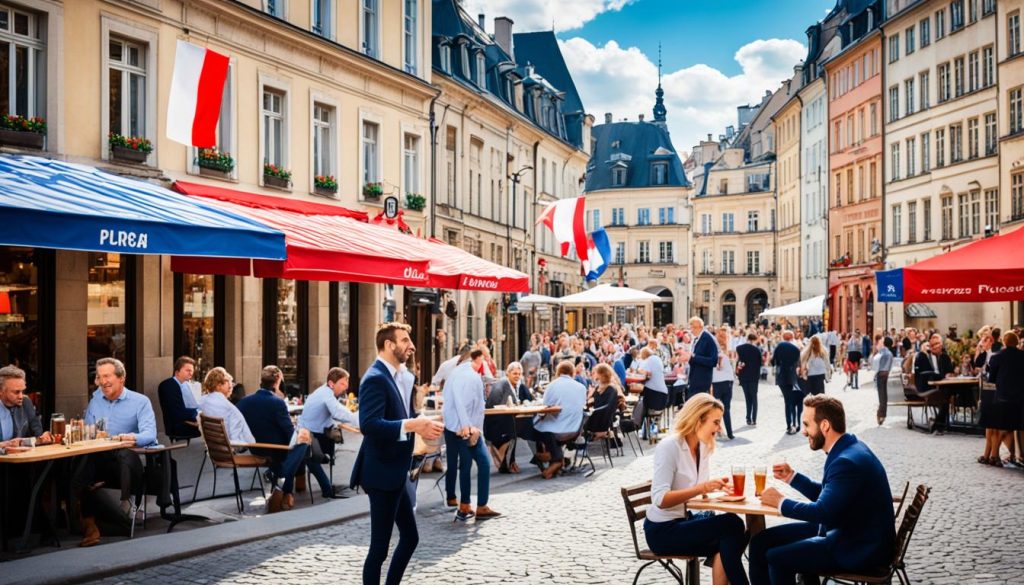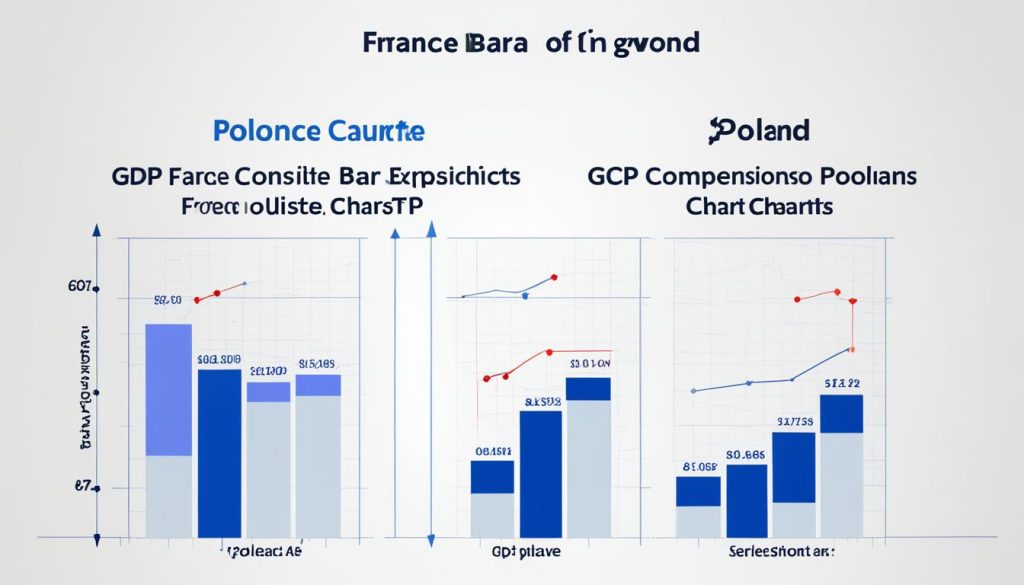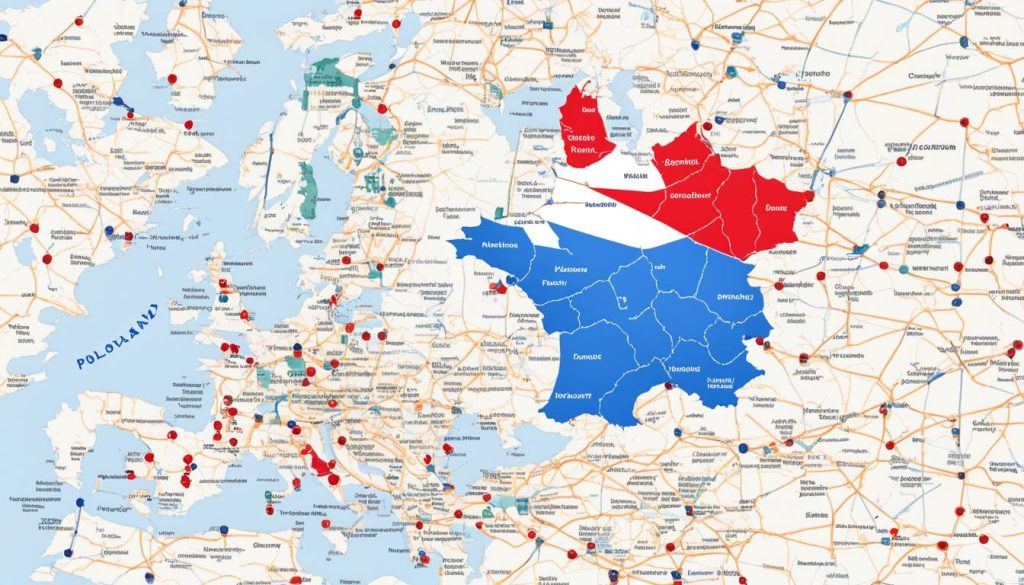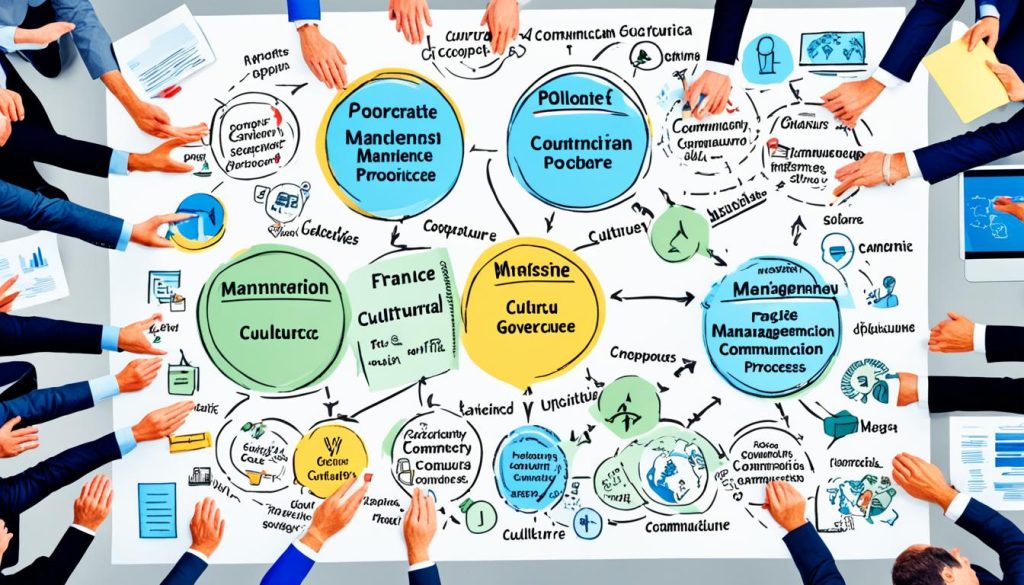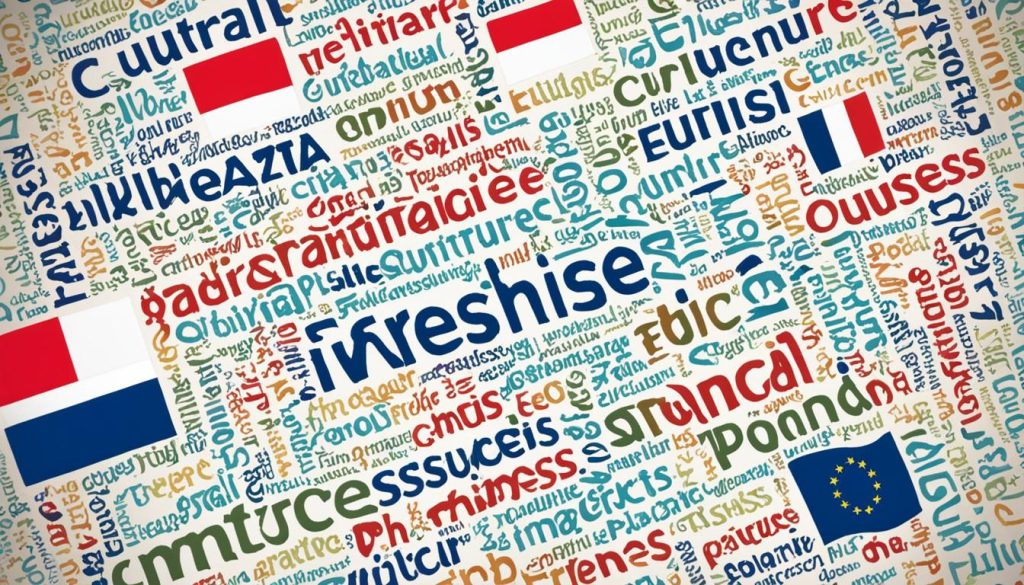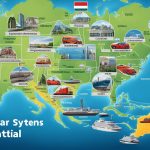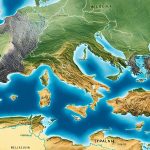Understanding international business means getting the culture and business ways right. This guide compares France and Poland. These two European places have deep histories and modern ways of doing business. The way people do things and manage work really mixes with business actions there.
It’s key to know these differences for success in working across cultures. We will look at France’s strong economy and love for tradition. And we’ll see how it stands against Poland’s lively and growing market. This will help anyone wanting to fit in well with the business ways of France and Poland.
An Overview of Business Practices and Cultural Perspectives in France and Poland
Getting to know the business etiquette in France and Poland is key to building lasting economic relationships. In France, using titles and last names is vital, showing respect and formality. Their way of doing business is direct, follows a strict order, and values taking time to make decisions. They put a high value on being reliable and honest.
On the other hand, Poland’s business manners also value formality and honesty but are influenced by its history. Its past under communism affects how people do business today, showing differences between older and younger generations. Younger people are more open to adopting Western business ideas.
- French management style leans towards the hierarchical, with a slow but steady process for reaching business decisions.
- Trust and honesty stand as pillars in the French professional setting, reflecting an ethical approach to economic interactions.
- Poland’s business culture values measurable outcomes and maintains a results-driven approach.
- Navigating Poland’s business landscape demands sensitivity to its preference for the term ‘Central Europe’, avoiding politically sensitive misclassifications.
- Both nations require a nuanced understanding of their business etiquettes to engage effectively in cross-cultural collaborations.
- Cultivating an awareness of the historical and cultural dynamics that shape business practices is key to management success.
In conclusion, the economic strength of France and Poland comes from their cultural uniqueness. Understanding these differences, as well as their business customs and management styles, is crucial. It helps in building strong cross-border partnerships and succeeding in cross-cultural management.
Economic Landscape: Comparing the GDP and Growth
When we look at France and Poland’s economies, comparing GDP is key. This, along with growth rates and other indicators, helps us grasp their economic strengths and issues. These factors show us the health and potential future growth of their economies.
France’s Economic Dynamics
In the EU, France stands out with its high GDP per capita. Its Gross National Income shows it’s a major player globally. Yet, France faces challenges like large public debt and a budget deficit. These issues reveal the complexity within its strong economy.
Poland’s Economic Structure
Poland, after moving away from communism, has seen significant growth. Its GDP is smaller but very dynamic compared to France. Poland enjoys low public debt and more economic freedom. These indicators show it as a country embracing trade and minimal government interference.
- Both countries aim for economic growth, though at different rates.
- GDP is crucial for understanding their economic sizes and outputs.
- Looking at unemployment, public debt, and freedom shows fiscal health and policy effects.
The interaction between these economic indicators offers insights. It tells us about current financial states and possible future paths for both nations.
Business Culture: Formality, Style, and Hierarchy
In French and Polish business, a mix of professional etiquette, organisational structure, and business protocols is key. It’s important to follow a set of formal rules. This helps build trust and respect, crucial for any successful partnership.
In France, formal greetings and titles are very important. They take hierarchy seriously. The Polish business scene also values formality but adds a layer of direct communication. Even with this directness, respecting the order of ranks is critical for smooth interactions and decisions.
- A firm handshake in France and Poland shows professionalism.
- Understanding titles and status is important in both countries’ business environments.
- In Poland, be ready for direct feedback and keep communications clear and factual.
In Poland, the mix of old and new business practices is unique. This mix affects how businesses run. Foreigners need to adapt to these Polish business protocols.
The French focus on following procedures closely. This makes their business dealings predictable and stable. In contrast, Polish professionals expect promises to be kept. This holds everyone accountable.
- Interactions in France and Poland are meaningful, with long-term effects.
- Respecting each other’s business practices builds strong partnerships.
To succeed in France or Poland, understanding their business etiquette is key. Recognising the details of their organisational structures allows for better navigation of their business cultures.
Employment and Labour Market Differences
France and Poland have very different labour market trends. This shows the unique economic chances each country has. In France, the mix of a low population density and a high GDP per capita contrasts with a high unemployment rate of 9.4%. This suggests its job market is more competitive. On the other hand, Poland’s unemployment rate is only 4.9%. This points to rising employment rates and strong economic growth.
In both countries, the economic opportunities are clear. Poland stands out with its good financial state. It has less public debt and a high Index of Economic Freedom. This means its economy is flexible and lively. Poland’s youth unemployment rate is 14.8%, which is much lower than France’s 22.3%. These figures show Poland’s economic health and hint at future employment rates.
- France’s higher unemployment rate illustrates a more competitive or complex job market.
- Poland boasts better job prospects, as evidenced by its lower unemployment figures.
- Poland’s vibrant labour market is complemented by lower public debt and greater economic freedom.
- The youth employment landscape in Poland aligns with dynamic labour market trends, contrasting with France’s position.
Both countries have unique ways to explore economic opportunities. Understanding these labour market trends is key. It helps businesses and individuals make the most of European markets.
Management Style and Corporate Governance: France vs Poland
In comparing France with Poland, we see vivid differences and evolving trends in management practices and corporate hierarchies. These are shaped by each country’s distinct governance style. France tends towards a more hierarchical, centralised system. Meanwhile, Poland combines traditional methods with new, modern influences.
The Role of Hierarchy and Seniority in France
In France’s business world, valuing experience is key. The nation’s corporate scene heavily favours hierarchy. It sticks to time-honoured management practices and values. Decisions are mostly made by those at the top, reflecting France’s preference for order and established corporate hierarchies.
Decision Making and Organisation in Polish Companies
Poland, however, tells a different story with its management practices. It shows a blend of respect for tradition and a move towards teamwork and flexibility. Young managers and entrepreneurs in cities lead this shift. They are subtly changing corporate hierarchies and influencing Poland’s governance style.
This comparison sheds light on how France and Poland tackle leadership and governance differently. The changes in French and Polish management styles spark discussions on adaptability and innovation in global business and corporate governance.
Distinctive Cultural Traits and Their Impact on Business Ethics
The blending of cultural impact and business ethics is vital for companies in France and Poland. The French accentuate formality and precision in ethical business dealings, influenced by their rich traditions. In contrast, Polish businesses have enhanced their practices, reflecting corporate responsibility, due to their historical evolution.
France’s diverse culture impacts its ethical business practices. You’ll see this in their focus on due diligence, transparency, and accountability. Meanwhile, Poland’s shift to a free-market economy has led to a higher standard of business ethics and responsibility.
Cultural understanding is crucial for businesses working abroad. It helps manage cross-border interactions respectfully. This boosts international partnerships. Here’s how these traits appear:
- Honesty is key in both countries, showing its universal importance in business.
- Commitment to due diligence ensures operations are conducted with integrity.
- Building trust through clear practices is essential for lasting relationships.
Now, in France and Poland, corporate responsibility is central to business strategies. It’s about more than following rules. It’s also about positively impacting society and the environment.
We see how each country’s culture shapes their business ethics. Recognizing these differences is crucial for navigating the global business scene. It allows companies to flourish in various regulatory and ethical settings.
Educational Systems: Influencing Business Culture and Innovation
In our study of France and Poland, we see that spending on education affects business innovation. This shows how such investments shape future markets, develop the workforce, and ensure businesses thrive. It helps us see how the economies of these countries might grow.
France and Poland stress the need to teach their people well. This knowledge helps start careers in a tough global market. It makes it easier for people to go from school to work.
Educational Expenditures and Their Reflection on Workforce Quality
France believes strongly in building a skilled workforce. They spend 5.5% of their GDP on education, more than Poland’s 4.8%. This shows France’s effort to prepare a workforce ready for future business challenges.
School Life Expectancy and Attitudes Towards Lifelong Learning
How long people stay in school shows a country’s commitment to ongoing learning. Poland leads with 16 years, and France follows with 15. These numbers show that both countries value lifelong learning. It’s key to personal and national growth, affecting business culture too.
Impact of Agricultural and Land Use on Economic Activities
The land in France and Poland supports their economies in big ways. France uses 52.7% of its land for farming, boosting its agricultural productivity. This helps its economy a lot. Poland, on the other hand, farms on 48.2% of its land. This shows a similar commitment to agriculture.
Both countries have special features that help their economies. France benefits from a long coastline. This allows for many types of crops and supports tourism and sea trade. In contrast, Poland has more people per area. It focuses on using its limited farm space wisely. The goal is to grow sustainably and start related businesses.
- France grows a variety of foods. This makes it a key player in global food markets and famous for its cuisine.
- Although smaller, Poland’s farm output is still important. It focuses on quality and new farming methods.
- Both acknowledge the role of sustainable agricultural practices. This helps keep their land productive and their economies strong.
These countries show how farming and taking care of the land connect to the economy. In France’s wheat fields and Poland’s potato fields, careful farming matters. It feeds people and builds a strong economy that can face future challenges.
Inflation and Cost of Living: How They Shape Consumer Behaviour
It’s essential to understand how inflation and cost of living affect economies and consumer choices. Recently, changes in inflation in France and Poland have led to different spending habits. These reflect changes in how much people can buy in these countries.
France’s Inflation Rate and Its Effects
France’s inflation rate is 5.2%. This impacts market dynamics. Yet, the average after-tax salary in France supports strong buying power. This keeps consumer spending healthy, helping to balance the market despite rising costs.
The Reality of Cost of Living in Poland
Poland faces a higher inflation rate of 14.4%. With a lower average monthly take-home pay, Polish people have less to spend. They must prioritise needs over wants, leading to careful spending. This makes them very sensitive to prices and careful with their money.
- Impact on essentials and non-essentials: Rising living costs hit not just luxuries but also basic needs.
- Consumer strategies: Families are budgeting, saving more, and looking for discounts.
- Market adaptation: Businesses adjust by offering better deals and value to keep customers spending.
The different inflation and economic situations in France and Poland show how consumers and markets adapt. They face challenges but also show resilience amid changing financial conditions.
Comparing Military and Security Expenditures and Their Influence on National Priorities
When we talk about defence spending, we’re looking at what countries value most. The money they put into military and security shows what matters to them on the world stage. It’s not just about having a strong army. This spending affects everything from national goals to how they deal with other countries.
How Defence Spending Reflects France’s Global Position
France sees itself as a major world player, and its budget shows it. By spending a lot on the military, France stays ahead in defence technology. It has a powerful air force and a strong armoured force. This investment is key to keeping the country safe and maintaining its influence worldwide.
Security Investments and Poland’s Strategic Interests
Poland, although spending less than France, knows what it’s doing with its budget. It invests 2% of its GDP in defence, which suits its needs perfectly. Poland’s choices reflect its past and the current global situation. It shows how deeply national security is linked to its overall priorities.
- Strategic alignment with NATO commitments
- Modernisation of military assets in response to regional security dynamics
- Investment in cybersecurity and defence infrastructure
Both France and Poland put a lot of thought into their defence budgets. This spending tells a story about their history, how they see themselves in the world, and their hopes for peaceful international relations.
Analysing Life Expectancy and Health Services: France and Poland in Contrast
France and Poland show big differences in life expectancy and healthcare systems. Let’s compare these two countries in Europe.
In France, people live up to 82 years on average. This is thanks to an accessible, well-supported health system. With more doctors per person, France shows how good healthcare can improve societal health.
- In-depth preventive care programmes
- Extensive healthcare coverage for all demographics
- State-of-the-art medical research and treatment facilities
Poland’s life expectancy is shorter, at 77.9 years. Fewer doctors per person could be a reason. This shows a gap in health service quality.
- Variations in public health policy
- Different levels of investment in healthcare infrastructure
- Challenges faced in rural areas concerning medical access
The health differences between these countries affect more than just life length. They impact the economy, workforce, and need for social services.
Crime and Safety: Public Perception and Reality
The health of a society can often be gauged by its public safety and crime rates. France and Poland show different crime statistics, affecting people’s view and actions. This difference touches both personal life and business matters.
- France sees a crime rate nearly 50% higher than Poland’s.
- Violence and serious crimes are more common in France.
- In contrast, Poland is seen as safer, possibly leading to its lower crime rates.
The way people see crime plays a big role in discussions about how well a society is doing. It causes worries about the safety of businesses and the public. Thus, it highlights the need for strong steps to protect everyone’s well-being.
- Closely watching crime rates and safety shows if police and courts are working well.
- With more crime comes the need to spend more on security for countries and businesses alike.
- How safe people feel affects big choices in international business.
In the broader business world, security is key. It impacts investment, tourism, and life quality. So, the crime and safety levels in France and Poland are very important for those entering these markets.
Language and Communication in Business: Overcoming Barriers
Effective communication is key to success in international business. Understanding both language and culture is essential in cross-cultural dealings. This is vital when working in different countries.
Language Proficiency and Its Role in Cross-Cultural Negotiations
Speaking a common language, like English, helps lower barriers in international talks. But, it’s more than just talking smoothly. Non-native speakers might struggle with English’s subtle points, such as idioms and cultural hints.
These details are crucial for clear and deep discussions. They also help in building trusted partnerships.
The Importance of Direct Communication and Local Nuances in Poland
In Poland, people value direct communication in business. This is different from the more indirect style common in Britain. Understanding these communication styles is important in business.
To avoid misinterpretations, companies should embrace the local way of communicating. This makes business talks clearer and relationships stronger.
- Understanding local idioms and business terminology to bridge language gaps.
- Appreciating the impact of cultural background on communication style.
- Improving language proficiency and training teams for better cross-cultural negotiations.
- Adopting communication strategies that respect directness and local nuances.
Quality of Life and Happiness Index: What the Numbers Say
Well-being is more than just money. It’s about how people live every day and the changes in society. Looking closely at happiness and quality of life shows us how social and economic elements affect how folks feel. As our world gets more connected, it’s important to study these indexes. This helps us understand the link between a country’s economy and its people’s happiness.
The Correlation Between Economic Prosperity and Life Satisfaction
Money matters because it helps people have stable, secure lives. Countries with more wealth, like France, often see better life quality for their citizens. But happiness doesn’t just come from money. Fair sharing of wealth and easy access to services also play a big part.
Impact of Culture and Lifestyle on Personal and Social Well-being
Culture and lifestyle really shape a society. In France and Poland, enjoying life and sticking together are key. These countries value living well and strong family ties. Such traditions help everyone feel better and more connected.
In the end, it’s not just about economic factors. Happiness also comes from being close to others and cultural richness. The mix of money and culture shows us many ways to improve life quality. Together, these factors help create a world where we can all be happy.
Conclusion
In comparing markets in France and Poland, we see a rich mix of culture and business. Both countries have their unique features. They show us how important it is to understand culture beyond just looking at numbers. The business styles in Paris and Warsaw highlight the need for smart, flexible international strategies.
France is known for its sophistication and formality. Poland offers a unique mix of old and new. These factors — education, health services, and quality of life — play a big role in their global business positions. To do well in France and Poland, one must be very sensitive and adaptable to their cultures.
Understanding culture is key to entering these markets successfully. It helps in navigating the complexities of trading across borders. This leads to better cooperation and growth. For a future where countries are more connected, it is vital to have a global strategy. This strategy should respect local differences and find common ground. It’s crucial for building strong partnerships and succeeding in French and Polish markets.

